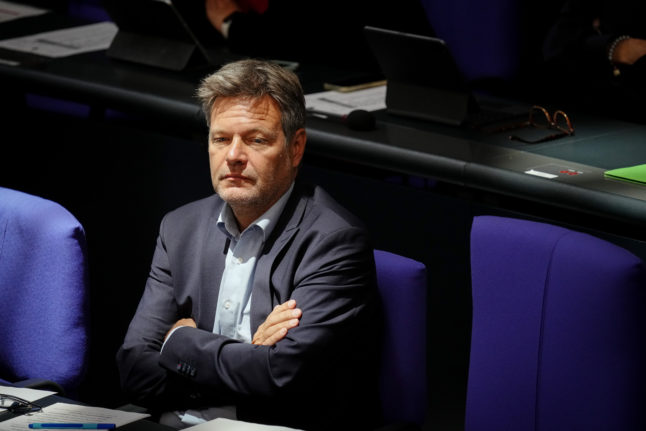The Russian invasion of Ukraine has unleashed economic turmoil in Europe, placing Germany’s new coalition government under pressure to firefight multiple crises.
Perhaps the largest of these is the energy crisis, which has prompted fears of gas shortages in the winter months and seen prices for fossil fuels soar for both households and businesses.
According to Economics and Climate Minister Robert Habeck, the staff at his ministry – who are charged with tackling the energy crisis – are struggling to cope with the extraordinary pressure that they have been under in recent months.
“People, at some point they have to sleep and eat too,” the Green politician said at a congress of the Federation of German Industries (BDI) in Berlin. “It’s not bullshit I’m talking now: people get sick. They have burnout, they get tinnitus. They can’t take it anymore.”
READ ALSO:
In the last nine months alone, the Economics Ministry has produced 20 laws and 28 ordinances, Habeck revealed. He said this was likely more than the ministry produced over the entirety of the previous four-year legislature.
Highlighting the strain that his staff were under, Habeck explained that it was always the same people in charge in drafting new laws in the battle to secure the energy supply.
To say that the Tourism Ministry could help restructure the electricity market would be like “telling the artist who made the sculptures that he can be the president of the Federation of German Industries,” the Green politician added.
Batting off criticism that the ministry had occasionally been slow to act, Habeck said: “Of course you could say, ‘why didn’t you do the regulation a week earlier’. But it’s not because people are sleeping, it’s because there is a limit to their physical capacity.”
Gas levy criticism
Germany has had to cope with an ever intensifying energy emergency over the past few months, culminating in Russia reducing supplies and then turning off gas deliveries via the Nord Stream 1 pipeline entirely in September.
Most recently, the government took steps to nationalise its largest gas supplier – Uniper – in a move to prevent the collapse of the country’s energy infrastructure. Uniper has suffered losses of billions of euros this year due to the costs involved in replacing cheap Russian gas supplies at short notice.
Habeck, who has appeared increasingly world-weary and exhausted in recent months, has faced sharp criticism for a number of decisions made during the crisis.
Most controversially, his decision to implement a gas levy to bail out major energy companies has been met with consternation from both the opposition and the Greens’ coalition partners, the Social Democrats (SPD).
On Friday, SPD leader Lars Klingbeil reiterated concerns about the fairness of the gas levy at a time when many are struggling to pay their energy bills.

In a situation where the government is facing multiple decisions in a short space of time, ministers also require the strength to “reconsider and correct their path”, Klingbeil told RND.
“(The gas levy) is about supporting the gas supply infrastructure,” he added. “However, this must be done fairly.”
In spite of the nationalisation of Uniper, Habeck has confirmed that the gas levy – which adds 2.4 cents per kilowatt hour of energy onto gas bills – will still be introduced on October 1st.
However, on Thursday he announced that there would be changes to Energy Security Act to ensure that only companies who needed the bailout would benefit from the levy.
According to the ministry, the changes are set to be passed by the cabinet on September 28th.
READ ALSO: Germany to push ahead with gas levy plans



 Please whitelist us to continue reading.
Please whitelist us to continue reading.
Member comments